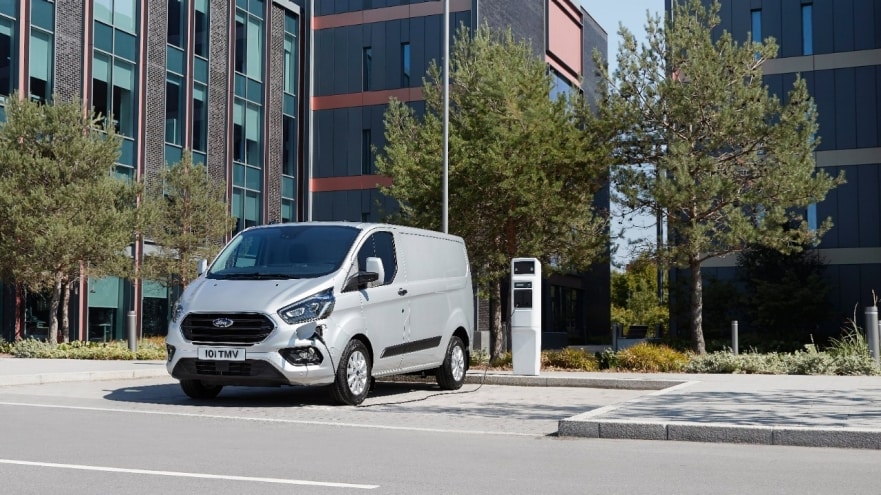- Three months after introduction of London Ultra-Low Emissions Zone (ULEZ), a new study reveals potential for cleaner city air from hybrid electric vans already available to order
- Businesses including Heathrow Airport, Sky, Speedy Hire, Transport for London and Vodafone took part in the 12-month study with Ford using 20 plug-in hybrid vans
- The hybrid van fleet covered more than 240,000 km (150,000 miles) real-world driving; 75 per cent of Central London mileage was driven on zero-local-emission electric power
- Ford launching further city trials in Cologne, Germany and Valencia, Spain, with plug-in hybrid vans and people-movers
Three months since the introduction of the Ultra-Low Emissions Zone (ULEZ) in London, results of a year-long trial in the U.K. capital suggest that plug-in hybrid electric (PHEV) commercial vehicles could present the most practical, readily available option for businesses trying to meet clean-air targets in cities.
The trial – which was supported by £4.7 million grant from the U.K. Government-funded Advanced Propulsion Centre – consisted of 20 Ford Transit Custom Plug-In Hybrid vans covering 240,000 km (150,000 miles) over a 12-month period. The trial sought to test whether businesses could carry out the typical daily duties of their diesel-powered vehicles, while maximising the use of zero-emissions electric-only mode.
The participants in the trial – Addison Lee Group, Autoglass, British Gas, Clancy Plant, DPD, Heathrow Airport, Interserve, Mears Group, the Metropolitan Police, Morrison Utility Services, RNLI, Royal Mail, Speedy Hire, Sky, Transport for London and Vodafone – represented a cross-section of city-based businesses, and integrated the Ford Transit Custom Plug-In Hybrid vans into their day-to-day operations.
During the trial, 75 per cent of the fleet’s mileage in Central London and 49 per cent in Greater London was completed using pure electric power. The results highlight that even without a fully established electric vehicle charging network, the hybrid vans were able to dramatically reduce tailpipe emissions in the inner city, using the flexibility of a petrol range-extender to complete longer journeys when required.
Commercial vehicles in London already make 280,000 journeys on a typical weekday, travelling a total of 13 million km (8 million miles) – and this figure is rising. Vans represent 75 per cent of peak freight traffic, with more than 7,000 vehicles per hour driving at peak times in Central London alone. A similar picture can be found in other major European cities, driven partly by rapid growth in online retail. Consequently, tighter emissions controls are being introduced by authorities throughout the continent, increasing pressure on businesses to find sustainable, practical solutions.
“Emissions-free mobility is essential for the future of our cities and their citizens, but we know there are still barriers we face in the move to electrification,” said Mark Harvey, director, Urban Electrified Van programme. “We also know that businesses still have legitimate concerns about the range of fully-electric vehicles, as well as their cost-effectiveness and reliability. These trials have helped Ford and its customers to investigate the extent to which PHEVs can help to achieve urban air quality goals, whilst not compromising on productivity.”
Ford has already incorporated learnings from the trial of prototype vehicles to optimise the Transit Custom Plug-In Hybrid production model that will go on sale to customers at the end of 2019. Enhancements include increased motor performance, optimised operating strategies, and revised displays to educate drivers in achieving maximum electric regeneration.
Further trials in Cologne and Valencia will provide data from different markets, cities and customer types, and will involve a mix of Transit Custom Plug-In Hybrid vans and new Tourneo Custom Plug-In Hybrid people-movers. These two models are the first vehicles in their classes to offer plug-in hybrid technology, and offer a standard eight-year battery warranty.*
The new vehicles target a zero-emission driving range of 50 kilometres (31 miles), and use a 1.0-litre EcoBoost petrol engine as a range extender for total range exceeding 500 kilometres (310 miles), thus eliminating range anxiety. A compact battery pack located under the vehicle floor can be conveniently charged using a standard 230-volt supply, and is designed so that the interior space and load capacity of the vehicle is not compromised.
“This trial is the first time Ford has given such early prototype vehicles to customers, and we’ve been able to incorporate their feedback directly into the production van,” Harvey said. “The response has been overwhelmingly positive – operators don’t want to give them back.”
Ford recently announced that a new all-electric Ford Transit will join the company’s European line-up of electrified commercial vehicles in 2021. Designed to deliver pure-electric propulsion, the new van will contribute to cleaner, quieter towns and cities, and reduced running costs for business and operators.**
Ford is the No. 1 commercial brand in Europe and Ford Transit range sales rose by 11.8 per cent in the first quarter of 2019 compared with the same period last year, with total sales of 81,700.
# # #
Transit Custom Plug-In Hybrid and Tourneo Custom Plug-In Hybrid anticipated CO2 emissions from 75 g/km, fuel-efficiency from 3.3 l/100 km
* Full details of limited warranty will be available from Ford dealerships
**Officially homologated fuel-efficiency and CO2 emission figures will be published closer to on-sale date

